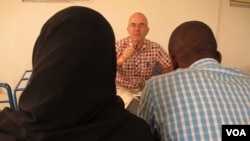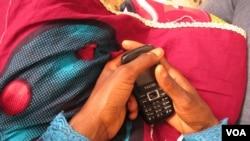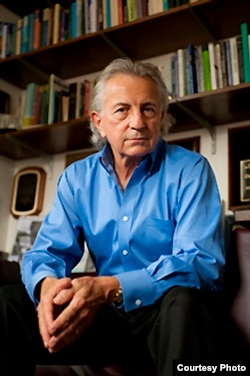When the head of Donka Hospital’s infectious disease unit fell ill in early March, Oulare Bakary cared for his dying boss. Then he, too, became sick.
Wracked by fever and nausea, the young physician "was very discouraged" to get diagnosed with Ebola. "There was no vaccine, no medicine," he recalled. "And it kills lots of people. Thus, it was panic."
But, Bakary recalled, "I accepted care and counseling." And, little by little, he got better.
Now he’s back to doctoring in this capital city’s main hospital. He also continues healing – himself and others – through a fledgling support group for Ebola survivors.
Membership in the new Association of People Affected By and Healed From Ebola is hard won, given the current outbreak’s fatality rate of at least 55 percent. Recovered patients learn of the group as they’re discharged from the Doctors Without Borders’ Ebola treatment unit at the hospital.
"Every time someone comes out, we make contact with them," Bakary said.
Survivors’ relatives and friends are welcome, too, recognizing that they’ve shared in the trauma.
Formalizing the group
The group had at least 100 nominal members as of late September, when four of them gathered to draft a letter seeking formal recognition from Conakry’s city government.
They met at the local offices of UNICEF. The United Nations organization is working with survivors "to help them develop solidarity – to help themselves and help others affected by Ebola," said Grev Lester Hunt, an American whose job as UNICEF’s sub-regional director in the Ebola fight takes him to Guinea, Liberia and Sierra Leone.
Hunt, a social mobilization specialist, said survivors can contribute to a so-called "resistance strategy." UNICEF and other health organizations enlist key individuals – religious leaders, successful business people, youths and survivors – to promote healthful behavior and try to fend off Ebola in their respective communities.
The survivors’ mere existence testifies that the virus isn’t always fatal, offering hope. And, with their intimate knowledge of the disease, "they’re much better placed to be the advocates" for healthful behavior to avoid or contain the illness, Hunt said. He said some of them will appear in a UNICEF documentary bearing that message.
UNICEF, with the U.S. Centers for Disease Control and Prevention, also is supporting West African governments in organizing a series of survivor gatherings. The first, in the Sierra Leone city of Kenema, brought in experts on trauma and recovery.
Fear of shunning
While helping others, survivors support each other in overcoming a profound sense of isolation and estrangement brought on by the disease, the four at UNICEF’s offices said. The stigma of Ebola infection – like that of HIV/AIDS – remains so keen that only one of them, Dr. Bakary, chose to use his actual name for this report.
Fatosh, a medical student, contracted the virus from a patient. Days later, she was admitted to the Ebola treatment unit. First as a caregiver, then as a recipient, she heard patients crying, writhing, vomiting, praying – and lapsing into silence.
Her recovery and subsequent release from the treatment unit exposed Fatosh to a different kind of torment.
Some people "said I was an escapee from the treatment center," Fatosh said, her eyes downcast as she spoke and Hunt translated her French into English, as he did with the others.
"For months, I’ve faced stigma at my house and the community – and school as well," added Fatosh, rubbing her cellphone like a big worry bead. "They look at me. They say, ‘She’s been sick so we shouldn’t go near her.’ "
Tahir, who is 22 and married, echoed her experience. While Ebola survivors have beaten the virus – and in fact have Ebola-fighting antibodies in their blood, at least for a while – he knows some people remain wary.
He had come to the meeting with Ibram, his older brother. Since spring, they have lost six relatives to Ebola – including a middle brother, the first in the family to get sick.
That brother had been Tahir’s partner in a small import-export business. A month after Tahir’s release from the Ebola treatment unit, he felt well enough to return to the shop, clean it from top to bottom and reopen its doors.
But "people were afraid of me. They stayed away from me," Tahir said.
Yet over time, most friends, customers and business associates have come back into Tahir’s orbit: "Eighty percent realize that I don’t represent a risk."
Lingering effects
The disease has had other lingering effects, the survivors said.
"Since Ebola, I can’t concentrate anymore. Psychologically, before the disease I wasn’t like this," said Fatosh, who distractedly rubbed her cellphone like a worry bead. Her joints sometimes ache, too.
Ibram complained of numbness in two fingers.
Conversely, all four survivors reported a newfound strength and determination to rebuild their lives.
"Ebola made me psychologically stronger," said Tahir, the businessman. Coming through his illness, "I have more confidence in myself."
Fatosh, the medical student, said she’s more committed to evangelizing about good hygiene and preventing Ebola’s spread.
Therapeutic value
Such positive actions can have therapeutic value, said Charles Figley, who directs Tulane University’s Traumatology Institute in New Orleans, Louisiana.
He has seen that in working with support groups for military veterans, and survivors of domestic abuse or sexual abuse by priests. The vets formed a political action group to help others obtain benefits. The sexual abuse survivors united through legal action, Figley said, and through talk “they were able to emerge with almost a collective therapeutic competence.”
No matter what the adversity, Figley said, survivors must confront five core questions:
- What happened?
- Why did it happen?
- Why did I act the way I did when I first found out?
- Why have I acted the way I have since that time?
- If this happens again, will I survive?
Bakary, the doctor, definitely sees himself as a survivor. Recovering from the disease “gave me courage to continue and go toward my objective” of healing.
"Ebola is real – it’s not a political or invented disease," he said. "It’s a mortal disease, but one you can get better from, with treatment. You have to first of all go early to the hospital."
Ibram said he’s convinced the Ebola outbreak will end soon "because we’re all going to work together."
But his brother Tahir acknowledged it will take a broad, concerted effort. He issued a challenge: "To all people with good will, come and help."







